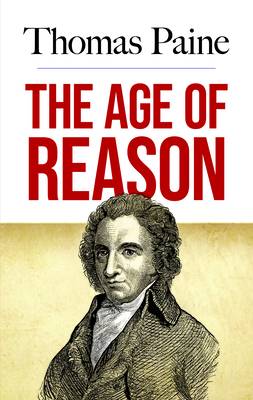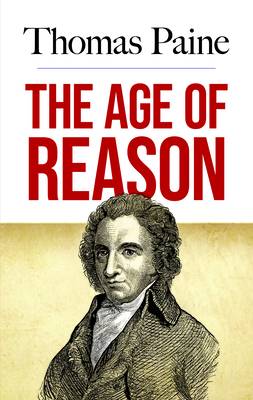
- Afhalen na 1 uur in een winkel met voorraad
- Gratis thuislevering in België vanaf € 30
- Ruim aanbod met 7 miljoen producten
- Afhalen na 1 uur in een winkel met voorraad
- Gratis thuislevering in België vanaf € 30
- Ruim aanbod met 7 miljoen producten
Zoeken
The Age of Reason
Being an Investigation of True and Fabulous Theology
Thomas Paine
Paperback | Engels
€ 17,45
+ 34 punten
Uitvoering
Omschrijving
"Of all the tyrannies that affect mankind, tyranny in religion is the worst," declared Thomas Paine, adding, "every other species of tyranny is limited to the world we live in; but this attempts to stride beyond the grave, and seeks to pursue us into eternity." Paine's years of study and reflection on the role of religion in society culminated with his final work, The Age of Reason. This coolly reasoned polemic influenced religious thinking throughout the world at the dawn of the nineteenth century, and its resonance remains undiminished by time.
The selfsame humanist and egalitarian views that made Paine a popular figure of the American Revolution brought him into frequent conflict with political authorities. Parts of The Age of Reason were written in a French jail, where Paine was confined for his opposition to the execution of Louis XVI. An atack on revealed religion from the deist point of view -- embodied by Paine's credo, "I believe in one God, and no more" -- this work undertakes a hitherto unheard-of approach to Bible study. Its critical and objective examination of Old and New Testatments cites nemerous contradictions as evidence against literal interpretations of the text. Well articulated and eminently readable, The Age of Reason is a classic of free thought.
The selfsame humanist and egalitarian views that made Paine a popular figure of the American Revolution brought him into frequent conflict with political authorities. Parts of The Age of Reason were written in a French jail, where Paine was confined for his opposition to the execution of Louis XVI. An atack on revealed religion from the deist point of view -- embodied by Paine's credo, "I believe in one God, and no more" -- this work undertakes a hitherto unheard-of approach to Bible study. Its critical and objective examination of Old and New Testatments cites nemerous contradictions as evidence against literal interpretations of the text. Well articulated and eminently readable, The Age of Reason is a classic of free thought.
Specificaties
Betrokkenen
- Auteur(s):
- Uitgeverij:
Inhoud
- Aantal bladzijden:
- 208
- Taal:
- Engels
Eigenschappen
- Productcode (EAN):
- 9780486433936
- Verschijningsdatum:
- 22/04/2004
- Uitvoering:
- Paperback
- Formaat:
- Trade paperback (VS)
- Afmetingen:
- 135 mm x 209 mm
- Gewicht:
- 204 g

Alleen bij Standaard Boekhandel
+ 34 punten op je klantenkaart van Standaard Boekhandel
Beoordelingen
We publiceren alleen reviews die voldoen aan de voorwaarden voor reviews. Bekijk onze voorwaarden voor reviews.








